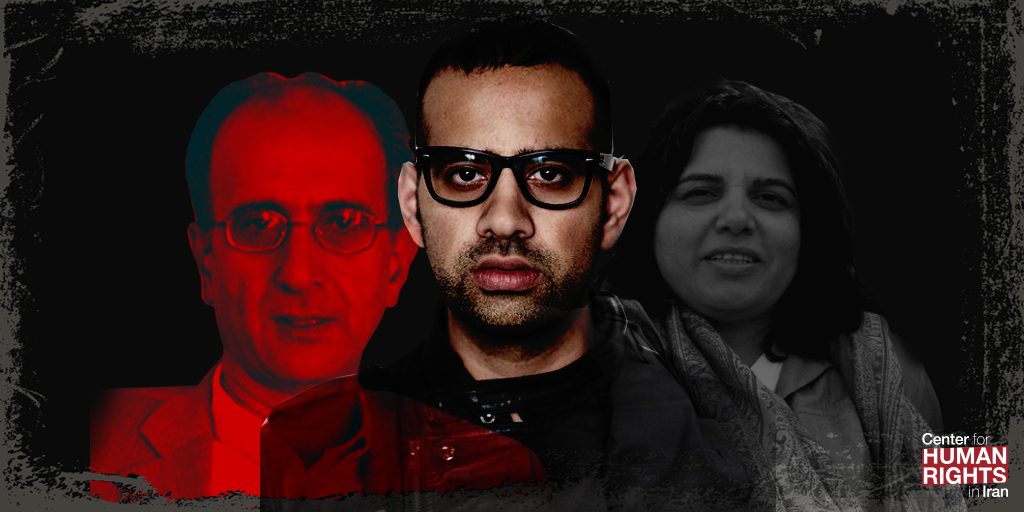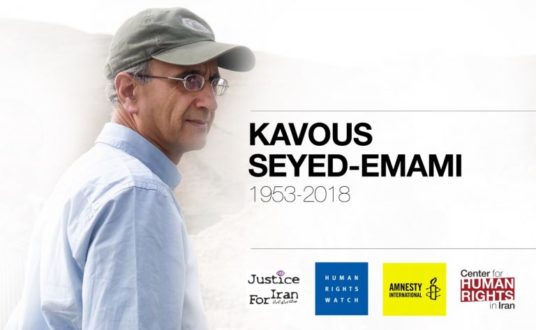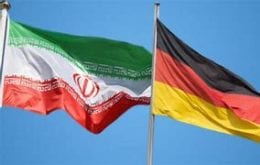CHRI – Widow Remains Barred From Leaving Country Despite Expired Travel Ban
One year after his father’s suspicious death in Tehran’s Evin Prison, Ramin Seyed-Emami has filed a petition to respond to the unsubstantiated reports about his father broadcast by Iran’s main state-run broadcasting organization.

He is also calling on the judiciary to release his mother, who remains barred from leaving the Islamic Republic despite the expiration of the travel ban that was imposed on her in December 2018.
“We only want to exercise our constitutional right to defend ourselves against accusations made against our father,” Ramin said in a phone interview with the Center for Human Rights in Iran (CHRI) on February 7, 2019.
“We are not a political family. We just want clarification on why our father was arrested and why he died,” added Seyed-Emami, an Iranian Canadian dual national who relocated from his home in Tehran in March 2018 to Vancouver, BC, after being repeatedly threatened by security agents.
“The Islamic Republic of Iran Broadcasting has to be accountable for slandering him,” he added.
The managing director of the Persian Heritage Wildlife Foundation (PHWF), Iranian Canadian sociologist Kavous Seyed-Emami (Ramin’s father) was among nine conservationists arrested by the Islamic Revolutionary Guard Corps’ (IRGC’s) Intelligence Organization in Iran in late January 2018 under trumped-up espionage charges.
His death, which occurred while he was being held virtually incommunicado for interrogations in Evin Prison, was reported to his wife as a “suicide” on February 9, 2018, after security agents interrogated her.
No final autopsy report was made public but a preliminary State Medical Examiner’s report did show evidence of an injection on his skin as well as “bruises on different parts of the body,” according to one of the Tehran-based lawyers representing the family.
Iran’s State Prisons Organization and the judiciary to which it responds, as well as prison officials, are responsible for the health and wellbeing of detainees. But one year after Seyed-Emami’s death, no one has been charged, prosecuted or held accountable.
Iran has also ignored international calls for an independent and impartial investigation into Seyed-Emami’s death, for his wife to be allowed to leave Iran, and for his colleagues to be given a fair trial.
Instead, for the past 12 months Tehran Prosecutor Abbas Jafari-Dolatabadi has been working on a case against Seyed-Emami’s detained PWHF colleagues based in part on false “confessions” despite three major state agencies contesting accusations that they committed espionage.
Iran Bars Grieving Widow From Leaving, Runs Smear Campaign on State TV
Ramin Seyed-Emami and his brother, Mehran, were able to leave Tehran on March 8, 2018, but their mother, Maryam Mombeini was blocked from boarding the plane with them at the last minute.
Security agents confiscated her passport and barred her from leaving the country. They also interrogated the grieving widow and raided her home after her two sons were gone.
“We want the travel ban on our mother to be lifted so that she can come to live with us,” said Ramin Seyed-Emami, adding, “We want to live in peace when we go back to Iran when all of this is over.”
He told CHRI he had submitted a letter via his lawyer in Tehran to Branch 9 of Iran’s Culture and Media Court requesting that the IRIB be ordered to allow him to respond to the “20:30” state-run news program that aired the unsubstantiated accusations on February 13, 2018.
Iran’s government-run Islamic Republic of Iran Broadcasting (IRIB) has a long history of parading Iran’s critics and their family members on national TV, where they are forced to make so-called “confessions” or public statements meant to discredit them and their causes.
Human rights groups have documented several instances in which dissidents, activists, and journalists were featured in pseudo-documentary videos intended to “prove” their “guilt,” though they apparently did not appear willingly.
“In the letter, we asked for the enforcement of Article 22 of the Constitution and Article 30 of the IRIB’s Governing Regulations,” he said. “By law, the IRIB must allow us to appear on air for free to give a response and respond to the accusations against our father,” Seyed-Emami added.
“To this day, we have no idea what happened to our father,” he said. “We have not been presented with any evidence or document to show he and the others broke the law.”
“The PHWF was a known legal institution whose activities were under the supervision of the government and the Department of the Environment,” he added. “We really don’t know the reason why it was shut down and the staff were arrested.”
Seyed-Emami continued: “If there was any evidence to show they were guilty, surely the Supreme National Security Council and the DOE would have taken action but both have declared that they were not spies. Instead of clarifying the issues, some of [Iran’s state] news outlets have been deceiving the public during the past year.”
“Those who incarcerated my father are the ones responsible for his death. They held him without evidence,” Seyed-Emami said. “They were negligent in safeguarding his life.”
Iranian judicial officials have not publicly explained why they barred Seyed-Emami’s widow from leaving the country or why the ban remains in place despite having officially expired. Family members of detainees held under politically motivated charges in Iran are routinely threatened and pressured by state agencies not to speak publicly about the cases.
“The authorities have said that the [travel] ban on Ms. Mombeini expired on December 22, 2018, but she is still not allowed to leave the country until the ban is rescinded by the judiciary’s security office because they are the ones who issued it,” Abuzar Nasrollahi, Mombeini’s lawyer, told the state-run Islamic Republic News Agency on February 6.
 Shabtabnews In this dark night, I have lost my way – Arise from a corner, oh you the star of guidance.
Shabtabnews In this dark night, I have lost my way – Arise from a corner, oh you the star of guidance.



